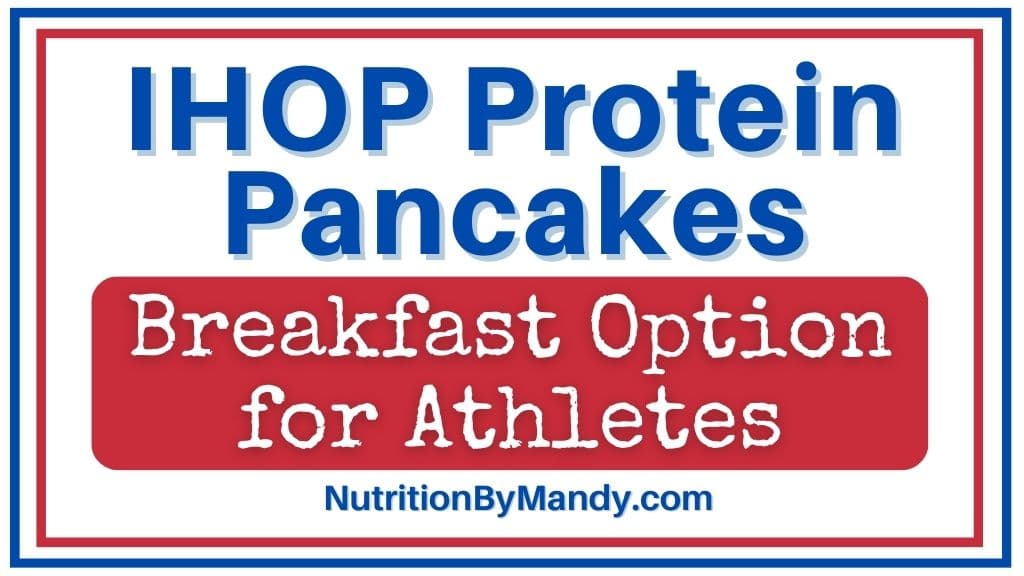Last Updated on October 18, 2023 by Mandy Tyler, M.Ed., RD, CSSD, LD
IHOP Protein Pancakes: Breakfast Option for Athletes
Athletes frequently enjoy stopping at IHOP for their favorite breakfast foods. In the spring of 2022, IHOP introduced Protein Power Pancakes as a new item on their menu. For athletes who love pancakes, the IHOP Protein Power Pancakes can be an easy option to help add protein to their breakfast.
Let’s take a look at the protein needs of athletes. Then we will review the IHOP Protein Power Pancakes and see how they can fit into an athlete’s sports nutrition meal plan.
Protein Needs of Athletes
Protein is an important nutrient in the diet of athletes. It has many important roles in the body and is necessary for the building and repairing of lean muscle mass.
Protein recommendations for athletes are typically based upon an athlete’s body weight. To get the most benefit from protein intake, athletes are encouraged to consume protein throughout the day with meals and snacks (1).
In regard to amount, athletes should aim to consume ~0.25 grams of protein per kg body weight at each eating occasion. In general, this calculates to be in the range of 20-40 grams of protein at each meal/snack, with larger athletes needing more protein than smaller athletes (1).
As a reminder, eating protein alone will not result in muscle gain. Protein intake must be combined with a well-planned sports nutrition diet as well as a strength training program to promote muscle growth.

What are IHOP Protein Pancakes?
IHOP advertises their Protein Power Pancakes as a “new protein-packed spin” on their classic buttermilk pancakes. The Protein Power Pancakes are made with whole grain rolled oats, barley, and rye. In addition, they contain chia seeds, flaxseeds, and whey protein.
Each IHOP Protein Power Pancake contains ~9 grams of protein. The IHOP original buttermilk pancakes provide ~4 grams of protein per pancake. Thus, the IHOP Protein Power Pancakes contain more than double the amount of protein as the original pancakes provide.
All the nutrition information included in this article comes from the IHOP® website. Menu options and nutrition information may change as products are updated. For the most current nutrition information, refer to the IHOP website.
Are the IHOP Protein Pancakes Available in Other Flavor Varieties?
IHOP offers the original Protein Power Pancakes along with two additional flavor options – lemon ricotta blueberry and strawberry banana. The nutrition content for one serving (4 pancakes) of each type of IHOP protein pancake is listed below.
- Protein Power Pancakes: 37 grams protein, 70 grams carbohydrates
- Lemon Ricotta Blueberry Protein Pancakes: 40 grams protein, 92 grams carbohydrates
- Strawberry Banana Protein Pancakes: 38 grams protein, 109 grams carbohydrates
IHOP Protein Pancake Combo
Athletes can also order their Protein Power Pancakes at IHOP as a combo meal. The combo meal includes two pancakes, two eggs, hashbrowns, and a breakfast meat selection.
For a leaner option, athletes should consider ordering ham, turkey bacon, or turkey sausage as their breakfast meat choice. These options are lower in saturated fat than traditional bacon or sausage and are healthier choices for athletes. Here is a comparison of the protein and saturated fat content of each of the breakfast meat options (2 pieces of each).
- Bacon: 6 grams protein, 3 grams saturated fat
- Turkey Bacon: 5 grams protein, 1 gram saturated fat
- Pork Sausage Link: 5 grams protein, 7 grams saturated fat
- Turkey Sausage Link: 8 grams protein, 1.5 grams saturated fat
- Ham (2-oz serving): 10 grams protein, 0 grams saturated fat
When ordering their pancakes, athletes should also request the butter be served on the side. Butter is high in saturated fat; by ordering it on the side athletes can control the amount added to their meal.
Are the IHOP Protein Pancakes Gluten-Free?
The IHOP Protein Power Pancakes are not gluten-free. The protein pancakes are made with wheat, barley, and rye, all of which contain gluten. Thus, athletes following a gluten-free diet will not want to order the protein pancakes at IHOP.
IHOP does offer Gluten-Friendly Pancakes that are made with rice flour. However, a serving of four Gluten-Friendly Pancakes only provides 9 grams of protein. Athletes following a gluten-free diet should consider ordering a side of ham or eggs and drinking 1% milk with their meal to help meet their protein needs at breakfast.

IHOP Protein Pancakes: Post-Workout Meal
Athletes stopping for a meal at IHOP following a workout or game may consider ordering the protein pancakes to help them meet their recovery nutrition needs.
The goals of recovery nutrition include:
- Hydrating – Replace fluid and electrolytes lost in sweat
- Refill Energy Stores – Consume carbohydrates to replace energy stores used during activity
- Build and Repair – Consume protein to help build and repair lean muscle mass
Athletes can enjoy a stack of the IHOP Protein Pancakes or a Protein Pancake Combo, which will provide them with a good source of both carbohydrates and protein. With the meal, athletes should drink water or a nutritious beverage, such as 1% milk or 100% juice, to help rehydrate following the workout.

IHOP Protein Pancakes – Breakfast Option for Athletes
For athletes who love pancakes, the IHOP Protein Pancakes can be an easy way to add protein to their breakfast or post-workout meal. If you are looking for additional sports nutrition tips for dining out, check out my blog: Building a High-Protein Chipotle Bowl for Athletes.
Join the Nutrition By Mandy Email List & Get a Free Athlete’s Grocery List
Click HERE to join the Nutrition By Mandy e-mail list. When you join you will receive a free athlete’s grocery list to print and take with you to the store.
About the Author
Mandy is a Sports Dietitian Nutritionist in the San Antonio, TX area. She is a Registered and Licensed Dietitian, a Board-Certified Specialist in Sports Dietetics, a Licensed Athletic Trainer, and is a Certified Exercise Physiologist through the American College of Sports Medicine. Mandy has experience working with athletes at the high school, collegiate, and professional levels. She believes the key to reaching one’s full potential, both in everyday life and in sports performance, relies on a healthy nutritional foundation. Learn more about the work Mandy does here.






